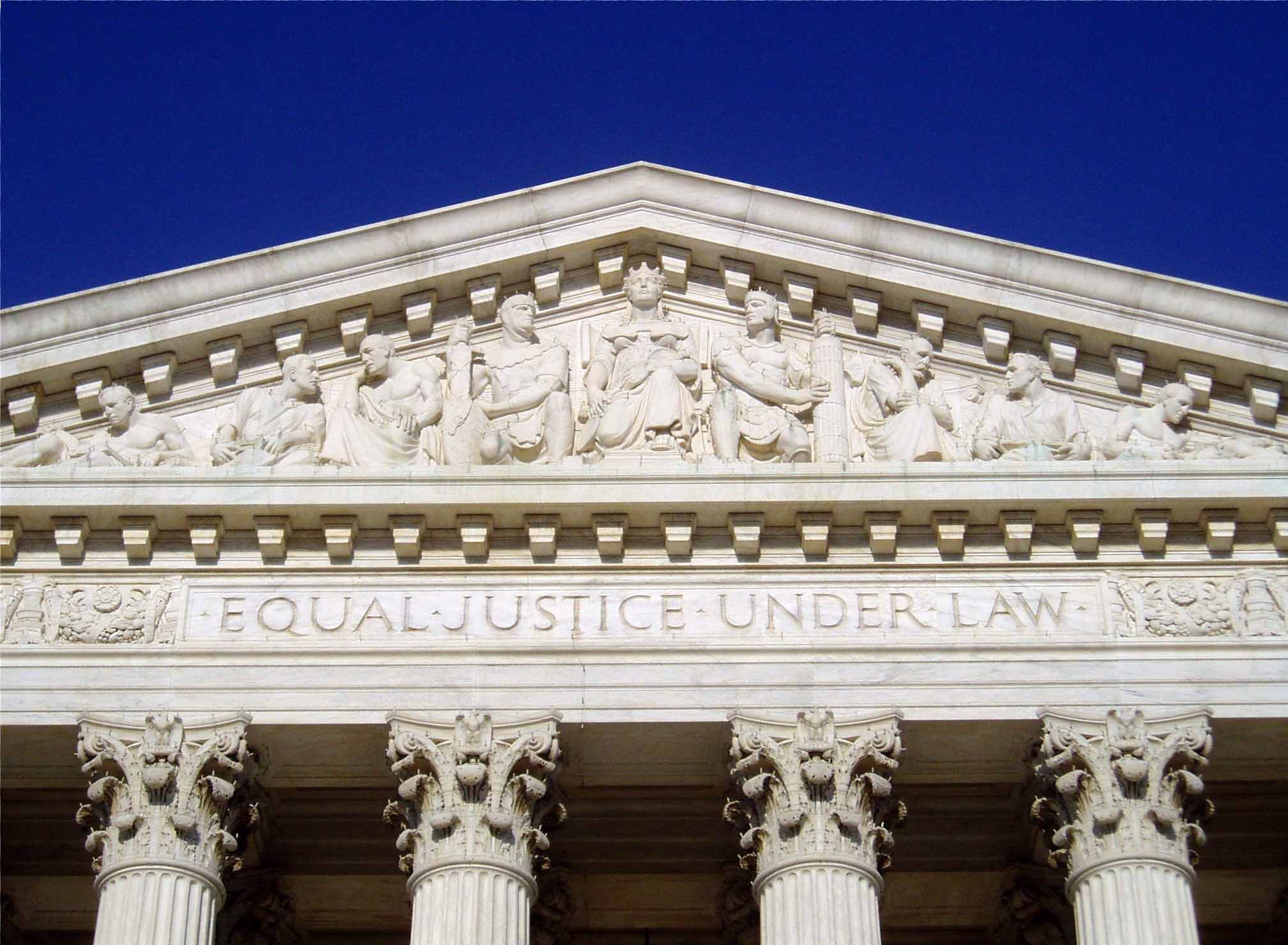Am 7. Mai hatte ich berichtet: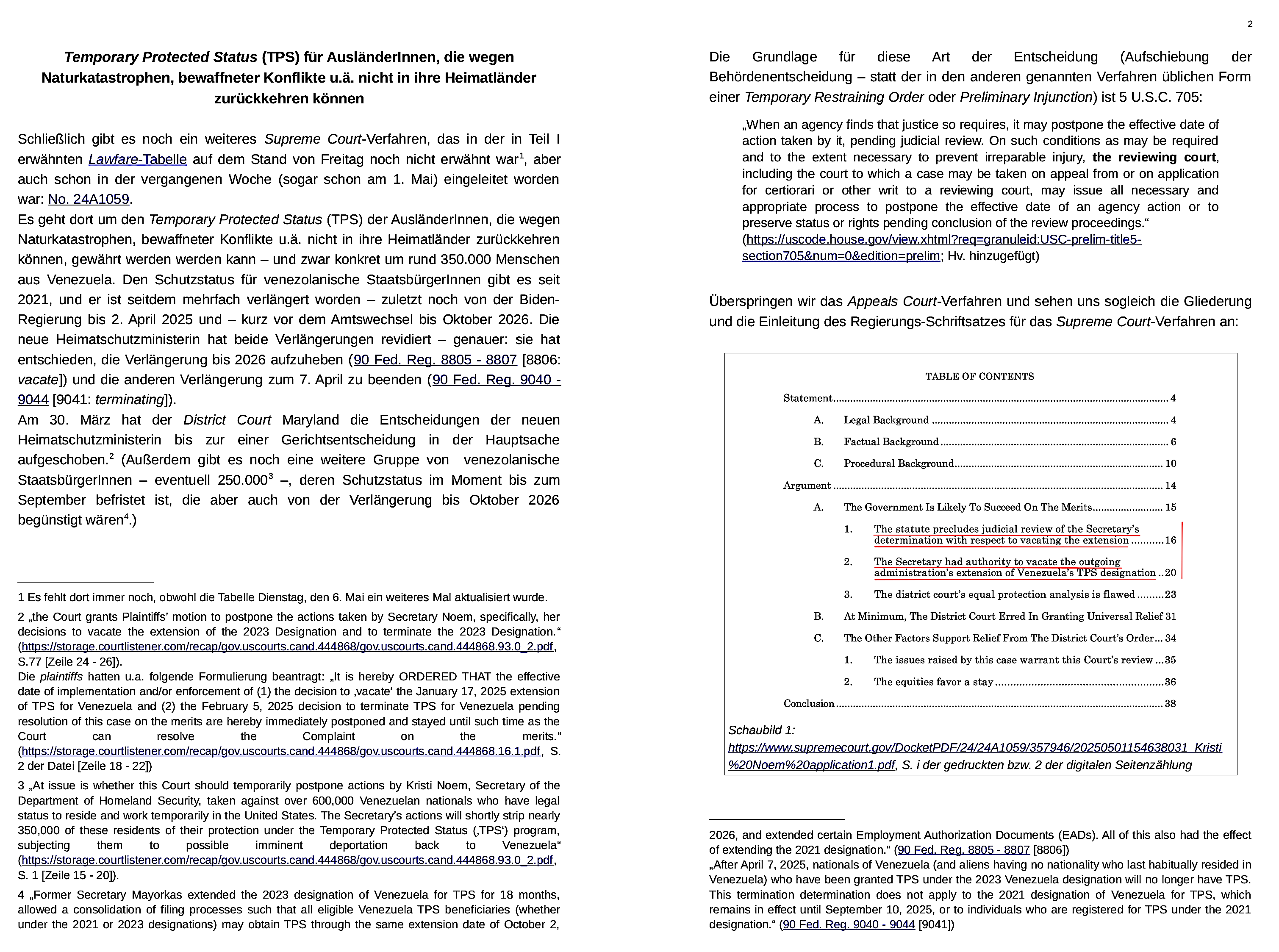
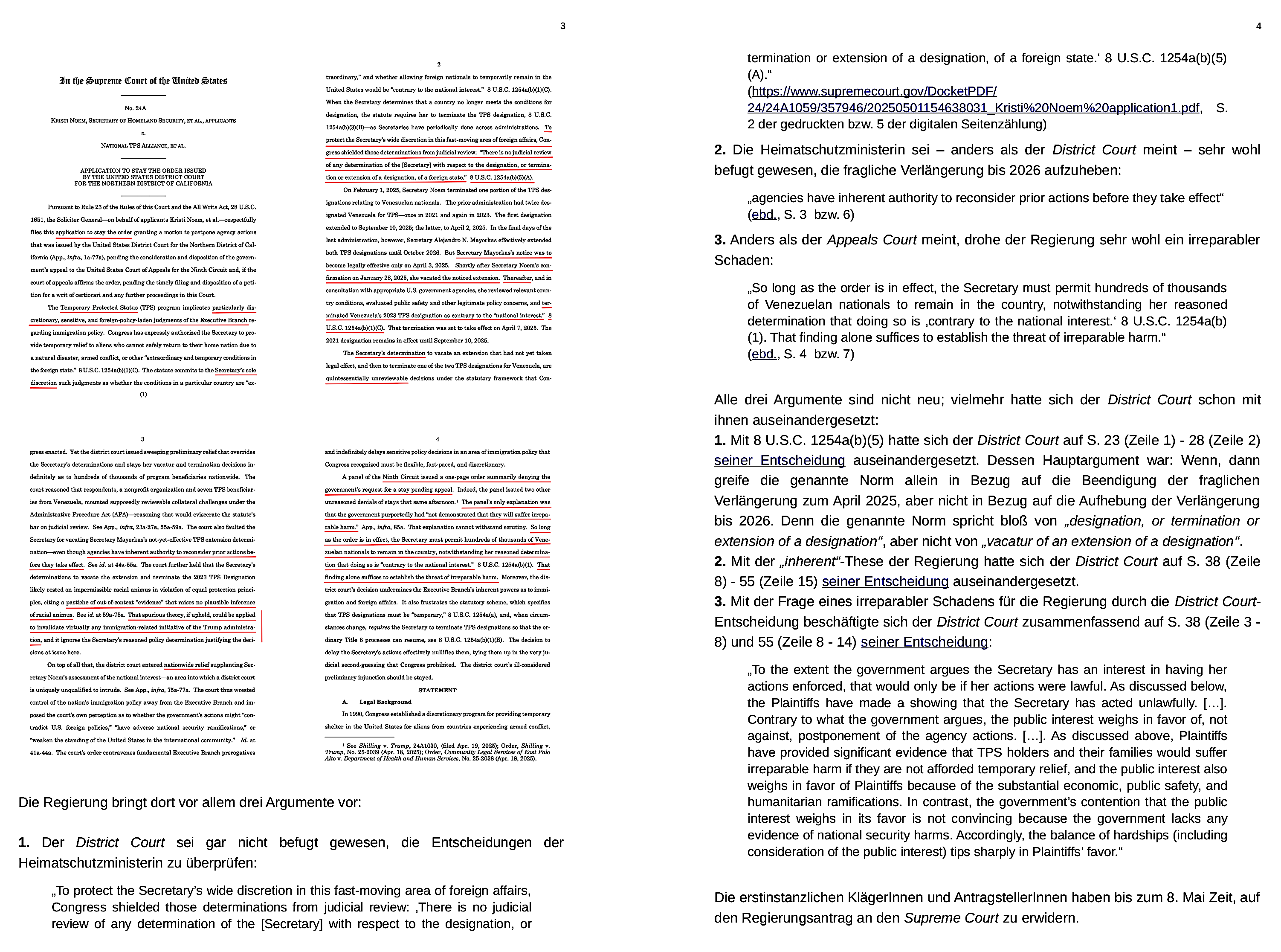
http://blogs.taz.de/theorie-praxis/files/2025/05/Nach_15_Wochen_Teil_III__TPS-Auszug.pdf (4 Seiten)
Am 8. Mai kam tatsächlich die Antwort auf den Regierungsantrag; sogleich am nächsten Tag die Rück-Antwort der Regierung.
Heute kam die – begründungslose – Entscheidung (dem stay-Antrag der Regierung wird stattgegeben):
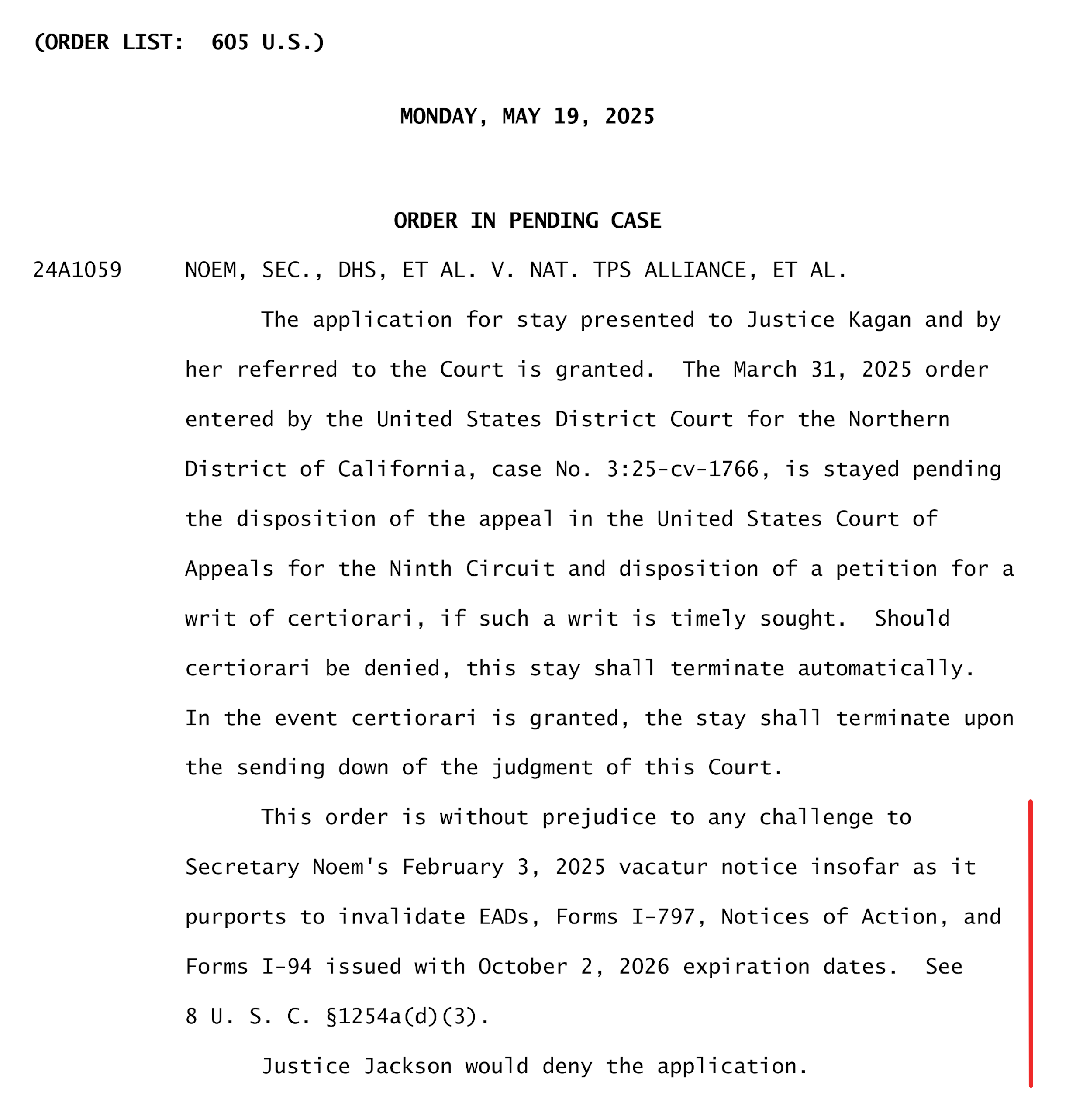
Aber wichtig ist das Ende:
„This order is without prejudice to any challenge to Secretary Noem’s February 3, 2025 vacatur notice insofar as it purports to invalidate EADs, Forms I-797, Notices of Action, and Forms I-94 issued with October 2, 2026 expiration dates. See 8 U. S. C. §1254a(d)(3).
Justice Jackson would deny the application.“
(https://www.supremecourt.gov/orders/courtorders/051925zr1_5h26.pdf)
Der letzte Satz bedeutet, daß die beiden anderen von demokratischen Präsidenten nominierten Richterinnen jedenfalls kein Bedürfnis hatten, ebenfalls öffentlich zu dissentieren; vielleicht haben sie der Entscheidung zugestimmt.
Zu dem drittletzten Satz schreibt Chris Geidner:
„Noem’s order revoking TPS is allowed to take effect during the litigation, but other documents issued to individuals because of TPS granted previously exist separately and, so, any attempt to say those documents are no longer valid can be challenged separately from this order.“
(https://x.com/chrisgeidner/status/1924507760047096113)
Da es 350.000 Betroffene gibt, dürfte es – sofern sie es schaffen sich anwaltliche Vertretung zu organisieren – einige Zeit dauern, bis eine erhebliche Zahl der Fälle abgearbeitet ist…
Nachtrag von Di., 9:48 Uhr:
Allerdings hat Chris Geidner inzwischen einen längeren Text zu der Entscheidung geschrieben, in dem es heißt:
„Aaron Reichlin-Melnick, a senior fellow at the American Immigration Council noted that, due to the narrow period of time between when Mayorkas extended TPS on January 17 and Noem’s action to vacate the order formalized on February 3, ‚virtually no one‘ would have documents with the October 2026 date on them.“
Das scheint sich darauf zu beziehen, daß die alte Regierung das TPS-Programm zwar verlängerte hatte, aber anscheinend noch nicht alle Betroffenen individuelle Bescheide darüber haben – und sich der Supreme Court-Vorbehalt aber ausschließlich auf diejenigen bezieht, die bereits Bescheide mit dem (Verlängerungs)Datum „October 2, 2026“ haben. (Der zitierte Aaron Reichlin-Melnick sagt außerdem in einem weiteren post: „not every person who is stripped of TPS will immediately be undocumented. Some may have some other forms of status that they have been applying for that they will be able to retain.“)
Es könnte auch sein, daß wir erst, wenn die Supreme Court Entscheidung zu landesweiten Prelimanry Injunction, über die am Donnerstag vor dem Gerichtshof (im Zusammenhang mit dem Staatsangehörigkeitsrecht) verhandelt wurde [*], vorliegt, wissen, was die gestrige Entscheidung für die TPS-Geschützten, die bisher noch keinen Verlängerungsbescheid erhalten hatten, bedeutet. Jedenfalls betrifft die gestrige Entscheidung ausschließlich den Eil-Rechtsschutz und noch nicht die Hauptsache.
Der District Court, bei dem die Hauptsache erstinstanzlich weiterhin anhängig ist, betont jedenfalls aus Anlaß eines Regierungsantrages aus Anlaß der Supreme Court-Entscheidung:
„To be clear, the Court’s discovery order requiring production today still stands. Defendants are expected to comply with that order unless and until the Court rules otherwise. The Supreme Court’s decision stayed the Court’s postponement order but did not stay the litigation on the merits. Defendants risk being held in contempt of Court if they do not comply with the Court’s discovery order.“
(https://www.courtlistener.com/docket/69655305/national-tps-alliance-v-noem/?filed_after=&filed_before=&entry_gte=&entry_lte=&order_by=desc#entry-143; Hv. hinzugefügt)
8 U. S. C. §1254a(d)(3) lautet:
„If the Attorney General terminates the designation of a foreign state (or part of such foreign state) under subsection (b)(3)(B), such termination shall only apply to documentation and authorization issued or renewed after the effective date of the publication of notice of the determination under that subsection (or, at the Attorney General’s option, after such period after the effective date of the determination as the Attorney General determines to be appropriate in order to provide for an orderly transition).“
(https://uscode.house.gov/view.xhtml?req=granuleid:USC-prelim-title8-section1254a&num=0&edition=prelim)
Zu den vorausgegangenen kompromiß-haften Entscheidungen des US-Supreme Court in Trump-Admin II-Verfahren siehe meinen Artikel vom 5. Mai:
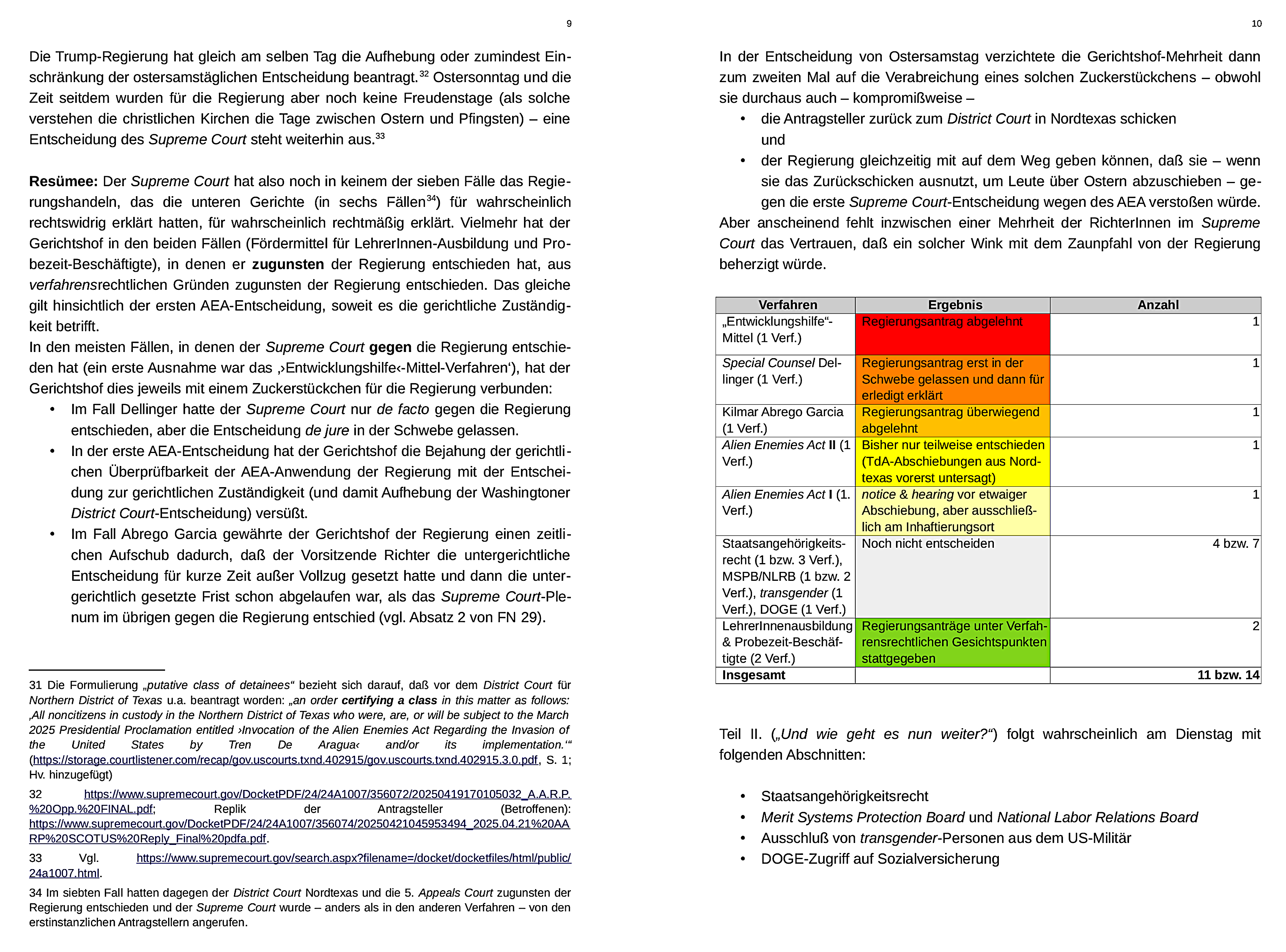
(http://blogs.taz.de/theorie-praxis/files/2025/05/Nach_15_Wochen__Teil_I_u_A3-Tab.pdf, S. 9 f.)
Seitdem ist die heutige Entscheidung die dritte Trump-Admin II-Entscheidung (die erste war wg. transgender-Personen im US-Militär; die zweite die dritte Alien Enemies Act-Entscheidung).
[*] Siehe dazu:
„I know it’s wonky, but the majority’s holding that plaintiff classes can be provisionally certified by district courts for purposes of providing temporary relief even without resolving the likelihood of full class certification is going to have an impact in lots of cases—well beyond the AEA. That impact may well help to mitigate the damage caused by a ruling in the birthright citizenship cases that does away with, or even narrows, nationwide injunctions. But it is almost certainly going to have significant effects in other contexts, too—and not just in challenges to Trump administration policies.“
(https://www.stevevladeck.com/p/151-the-supreme-courts-alien-enemies)
„I already wrote a lengthy post about Friday’s ruling in “A.A.R.P. II”—in which a majority of the Court indefinitely blocked any further removals under the Alien Enemies Act of anyone detained in the Northern District of Texas. I thought I’d use today’s regular issue of the newsletter to do two things: to expand a bit on one of the points I made Friday—that the A.A.R.P. ruling paints Thursday’s oral argument in the birthright citizenship cases in a very different light; and to take a step back and say a bit more about the real stakes of all of these cases, i.e., when is the entire federal government ‚bound‘ to comply with a federal court ruling?“
(https://www.stevevladeck.com/p/152-non-party-relief-and-judicial)
Dazu später vielleicht in einem separaten Artikel noch mehr.
